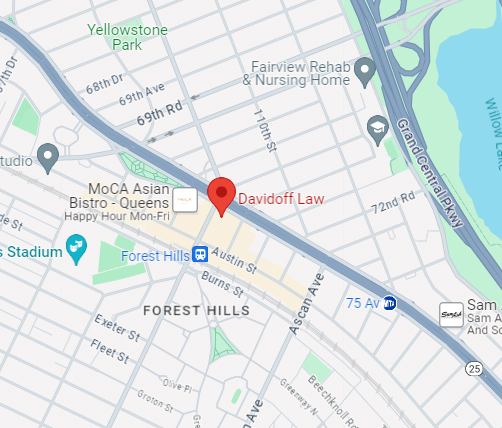
Motorcycle accidents in Queens can be life-changing. Riders face unique risks on the road, often resulting in serious injuries or fatalities. Being aware of your rights and options after a motorcycle crash is crucial. That's where Davidoff Law Personal Injury Lawyers comes in - we're here to provide expert legal assistance to motorcycle accident victims.
You might be dealing with injuries, medical bills, and insurance companies. Our Queens motorcycle accident lawyers have the expertise and dedication to help you through this challenging time. We focus on getting you the compensation you deserve so you can focus on recovery. Our Queens motorcycle accident attorneys would be happy to review your motorcycle accident case. Our motorcycle accident lawyer can review your motorcycle crash to see if you can file a strong motorcycle accident lawsuit.
Learn more about our services below. Then, contact us today to schedule a free case evaluation.
Table of Contents
How Our Queens Motorcycle Accident Attorney Can Help You
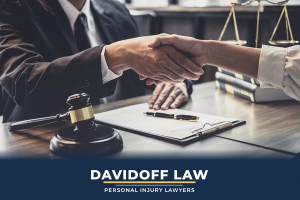
Initial Consultation and Case Evaluation
During your first consultation, we will hear your story and evaluate your case. We assess the details of the accident and advise you on the best legal course of action. We know that motorcycle accidents occur when people least expect them. Our goal is to understand your situation fully and provide clear guidance on your rights and options. This first step is crucial in setting the direction for your case. Reach out to us promptly to schedule an appointment at our office.
Investigation and Evidence Gathering
We conduct a complete investigation of your crash. This includes collecting police reports, medical records, and witness statements. Gathering solid evidence is key to building a strong case. Our team works until we have all the facts to support your claim. We put motorcycle riders first. We want to make sure that we leave no stone unturned when it comes to your case.
Communication With Insurance Companies
Dealing with insurance companies can be tricky. We take care of all communications with the insurance companies on your behalf. Our team negotiates aggressively to ensure you get the maximum compensation. We protect your interests and prevent insurance companies from undervaluing your claim. Let us negotiate with the insurance company on your behalf.
Filing a Personal Injury Lawsuit if Necessary
If a fair settlement is not possible, we are prepared to file a personal injury lawsuit. We guide you through the legal process and keep you informed at every step. Our skilled lawyers are ready to represent you in court, fighting for your rights. We aim to secure the best possible outcome for your case.
Legal Considerations in Queens Motorcycle Accidents
Motorcycle accidents in Queens involve various legal considerations. New York laws specific to motorcycles affect how these cases are handled. Understanding these laws is essential for your claim. Like other motor vehicles, motorcyclists need to follow the rules of the road and comply with all traffic signs and regulations. Our attorneys are experts in motorcycle accident law and ensure your case complies with all legal requirements.
New York Motorcycle Laws
New York has specific laws that apply to motorcycles. These include helmet and eye protection requirements, lane-splitting rules, and insurance requirements. For example, lane splitting is illegal in NYC. All motorcycle riders and passengers are mandated to wear a helmet. It's important to understand how these laws affect your accident claim. Our lawyers are well-versed in these regulations and how they impact your case.
Comparative Negligence in Motorcycle Accidents
New York follows a comparative negligence system in motorcycle accidents. This means your compensation can be reduced by your percentage of fault in the accident. Understanding comparative negligence is vital in maximizing your claim.
Top Causes of Motorcycle Accidents
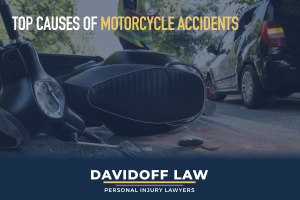
Motorcycle accidents can happen for various reasons. Identifying the cause of your accident is crucial in determining liability. Our team investigates every aspect to pinpoint the exact cause of your accident. This helps us build a strong case on your behalf.
Vehicle-Driver Negligence
Vehicle-driver negligence is a common cause of motorcycle accidents. This includes failure to yield, improper lane changes, and not seeing the motorcyclist. We gather evidence to prove the other driver's negligence. Proving negligence is crucial for your compensation claim.
Distracted Driving
Distracted driving is a major threat to motorcyclists. This includes texting, using a GPS, or other distractions. Proving the other driver was distracted can significantly strengthen your claim.
Lane Changing Accidents
Lane-changing accidents are common in motorcycle crashes. These often occur when a vehicle driver fails to check their blind spot. We investigate these accidents and gather evidence to prove the other driver's fault. Proving fault in lane-changing accidents is key to your claim.
Speeding and Reckless Driving
Speeding and reckless driving frequently cause motorcycle crashes in the local area. These behaviors show a disregard for the safety of others, including motorcyclists. We use evidence like traffic camera footage and witness statements to prove the other driver's reckless behavior.
Common Motorcycle Accident Injuries
- Head Injuries: Head and brain injuries are typical in motorcycle crashes, even with helmet use. These can include concussions, contusions, and even penetrating head injuries. We understand the seriousness of these injuries and work to ensure your compensation covers all medical expenses and rehabilitation costs.
- Broken Bones: Motorcyclists often suffer broken bones in accidents. These injuries can be serious, requiring surgery and long-term rehabilitation. We fight to get you the compensation that covers all medical treatment and any necessary long-term care.
- Road Rash: A road rash is a painful injury that takes place when a motorcyclist slides along the pavement. This can lead to serious skin abrasions and infections. We ensure that your claim includes the cost of treating these injuries and any related complications.
- Emotional Trauma: Motorcycle accidents can also cause significant emotional trauma, including anxiety, depression, and PTSD. We recognize the impact of these psychological injuries and strive to secure compensation that acknowledges your emotional suffering in addition to your physical injuries.
Factors Contributing to Motorcycle Accidents
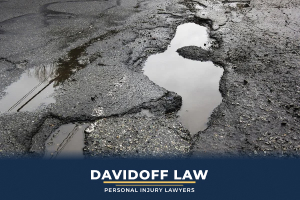
- Road Conditions and Hazards: Poor road conditions, like potholes and debris, can be especially dangerous for motorcyclists. We examine the role that road conditions played in your accident and work to hold the responsible parties accountable.
- Weather Conditions: Meteorological factors such as rain, fog, and ice can increase the risk of motorcycle accidents. We consider these factors when building your case, demonstrating how weather may have contributed to the accident.
- Vehicle Defects: Sometimes, a defect in the motorcycle or another vehicle involved can lead to an accident. We investigate if vehicle defects played a role and pursue claims against manufacturers when appropriate.
- Impaired Driving: Driving while under the influence of drugs or alcohol is a common and major factor in motorcycle accidents. We work to prove impairment in these cases, which can be crucial for securing maximum compensation.
Steps You Need To Take After a Queens Motorcycle Accident
- Seek Medical Attention: Immediately get medical attention for your catastrophic injuries. This is important for your health and also creates medical records that serve as evidence.
- Report the Accident: Report the accident to the police. A police report is a vital piece of evidence for your claim.
- Gather Information: Secure contact and insurance details from all parties involved. Also, get the contact details of any witnesses.
- Take Photos: If possible, capture images of the accident scene, including all vehicles involved, road conditions, and any visible injuries.
- Avoid Admitting Fault: Exercise caution on what you say after the accident. Do not admit fault or make statements that could be used against you.
- Notify Your Insurance: Advise your insurance company about the accident. However, be mindful of what you say, as insurance companies often look to minimize payouts.
- Consult an Attorney: Contact a motorcycle accident attorney as soon as possible. A lawyer can guide you on how to proceed and help protect your rights.
The Role of Insurance Companies in the Process
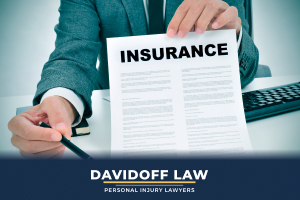
Insurance companies play a critical role in motorcycle accident claims. They often try to minimize the amount they pay out. It's important to remember that insurance companies are looking out for their interests, not yours. Our team negotiates with insurance companies to ensure you receive fair and just compensation.
Insurance companies will frequently attempt to deny or refuse claims or offer especially low settlements. We emphasize the importance of having a proficient attorney who can effectively negotiate with these companies. Our team at Davidoff Law Personal Injury Lawyers has the expertise to work with insurance providers and push for the compensation you deserve.
Determining Liability in a Motorcycle Accident in Queens
Figuring out who is at fault in a motorcycle crash is crucial. We investigate every aspect of the accident to establish liability. This includes reviewing police reports, analyzing evidence, and consulting experts. Proving liability is essential for a successful claim.
Statute of Limitations for Motorcycle Accidents in Queens
In Queens, NY, there is a legal timeframe for initiating a motorcycle accident claim known as the statute of limitations. Typically, you have three years from the date of the accident to lodge a personal injury lawsuit. It's important to act quickly and consult a lawyer to make sure your claim is filed on time.
Compensation for Motorcycle Accident Victims
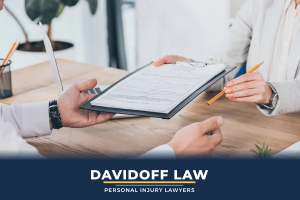
Victims of motorcycle accidents are entitled to various forms of compensation. This compensation is meant to cover the losses and damages suffered due to the accident. Our attorneys work to ensure you receive the full compensation you deserve.
Medical Expenses
Healthcare expenses often form a significant part of the compensation after a motorcycle accident. This includes costs for emergency treatment, hospital stays, surgeries, medication, and rehabilitation. We work to ensure that all your current and future medical bills after a motorcycle crash are covered.
Lost Wages and Income
If your injuries stop you from working, you could be owed compensation for lost wages and income. This includes lost earning capacity if your injuries affect your ability to work in the future. We calculate these losses to ensure you are compensated fairly.
Pain and Suffering
Pain and suffering compensation covers the physical and emotional distress caused by the accident. This includes compensation for chronic pain, emotional trauma, and reduced quality of life. We understand the importance of this compensation and fight to get you what you deserve.
Property Damage
Property damage compensation should take care of the cost of repairing or replacing your motorcycle. This can also cover any other personal property damaged in the accident. We guarantee that you receive fair compensation for all property damages.
Wrongful Death Claims
If a loved one has died in a motorcycle collision, you could be eligible to file a wrongful death claim. This can provide compensation for funeral expenses, lost companionship, and the family's financial losses. We handle these sensitive cases with the utmost care and respect.
Schedule a Free Consultation With Our Queens Motorcycle Accident Lawyers at Davidoff Law Personal Injury Lawyers Today
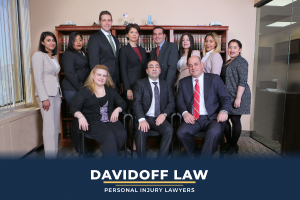
If you or a loved one has been involved in a motorcycle accident in Queens, don't face the legal challenges alone. Our experienced motorcycle accident lawyers at Davidoff Law Personal Injury Lawyers are here to help. We are aware of the complexities of motorcycle crash cases. We will fight for you.
Our team will review your case, provide expert legal advice, and guide you through the process of securing the compensation you deserve. Call us now to schedule your consultation and take the first step towards recovery.


